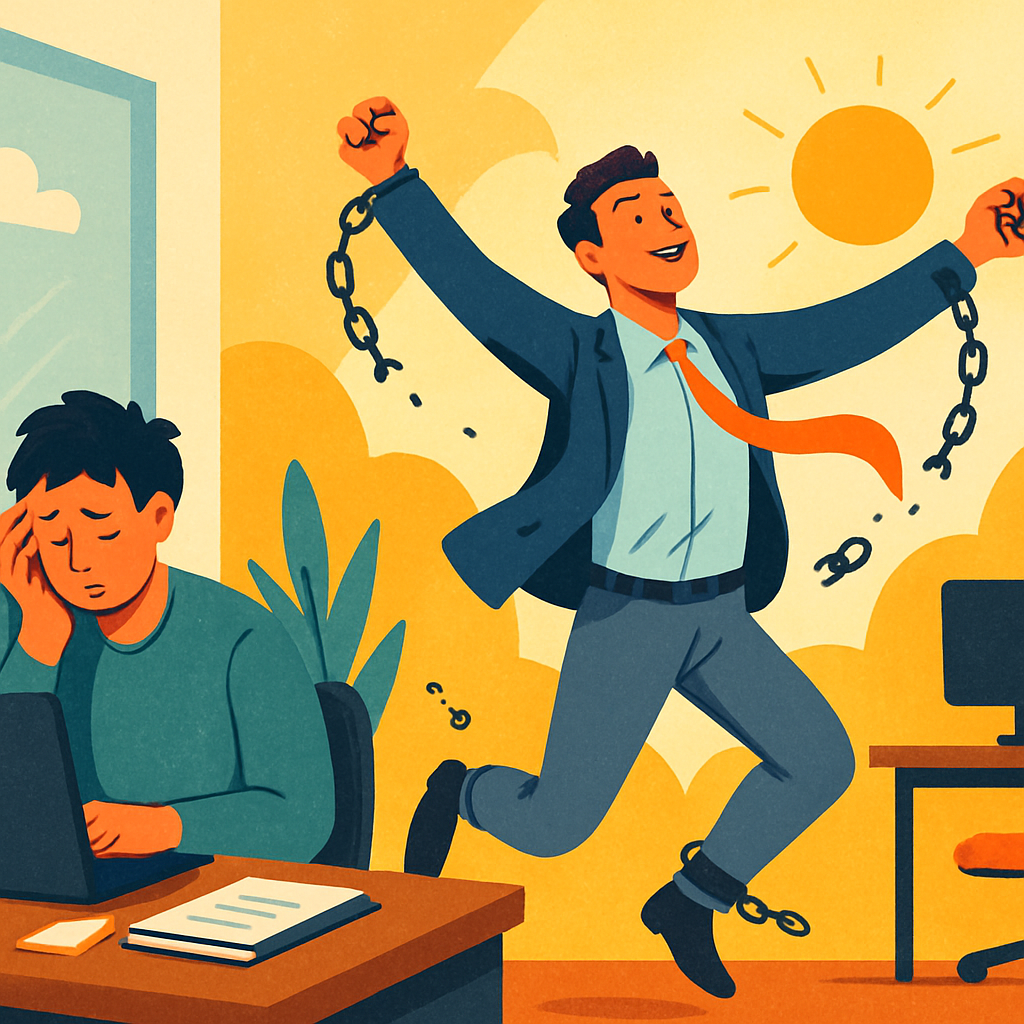Feeling exhausted, detached, and uninspired at work has become a widespread issue in today’s workforce. In fact, job fatigue is no longer limited to high-pressure roles—it’s affecting employees across industries, from remote workers to healthcare professionals. With the ongoing discussion around burnout, work-life balance, and mental health, many professionals are now seeking practical ways to reignite their motivation.
If you’re feeling stuck in a cycle of fatigue and frustration, you’re not alone—and there are real, actionable steps you can take to recover your energy and love for your career.

Understanding Job Fatigue: Why It’s Rising in 2025
Recent studies show that job fatigue is more prevalent today than ever before. According to a 2024 report from the American Psychological Association, over 70% of workers reported feeling stressed or fatigued at least once a week (source). Several factors contribute to this growing trend:
- Always-on culture: Remote work blurred the boundaries between personal life and professional obligations.
- Lack of recognition: Employees often feel undervalued, leading to emotional exhaustion.
- Economic uncertainty: Concerns about job security add to mental pressure.
- Misalignment of values: When personal values and work expectations clash, passion dwindles.
Recognizing that job fatigue is a signal—not a personal failure—is the first step toward making a meaningful change.
Signs You Might Be Experiencing Job Fatigue
Before you can address job fatigue effectively, it’s important to identify the warning signs. Some of the most common symptoms include:
- Persistent tiredness, even after a full night’s sleep
- Apathy or lack of enthusiasm for work projects
- Increased irritability or impatience with coworkers
- Decreased productivity and creativity
- Physical symptoms like headaches or muscle tension
If these experiences sound familiar, it’s time to consider strategies for recovery.
7 Practical Strategies to Beat Job Fatigue
Beating job fatigue requires a multi-dimensional approach that tackles both mental and physical well-being. Here’s how to start reclaiming your passion for work:
1. Reconnect with Your “Why”
Refocus on the original reasons you chose your profession. Whether it’s helping others, creative expression, or building a legacy, identifying your purpose can reignite your internal drive. Create a short list of what initially excited you about your work and reflect on how you can bring those elements back into your daily routine.
Key takeaway: Rediscovering your sense of purpose is one of the strongest antidotes to job fatigue.
2. Redesign Your Workday
A rigid 9-to-5 routine can intensify feelings of stagnation. Explore flexible work models if available. Simple changes like blocking “focus hours,” reducing unnecessary meetings, or taking a 15-minute outdoor break each afternoon can make a substantial difference.
Incorporating micro-breaks is supported by research from Stanford University, which found that short, regular breaks help to significantly reduce cognitive fatigue (source).
3. Set Clear Boundaries
One major cause of job fatigue is blurred work-life boundaries, especially for remote workers. Set defined “offline” hours and stick to them. Disable work notifications after a certain time and communicate your boundaries clearly with your team.
Protecting personal time is crucial for long-term sustainability and well-being.
4. Refresh Your Skill Set
Monotony often fuels fatigue. Engaging in professional development can break the cycle. Whether it’s enrolling in an online course, attending webinars, or shadowing a colleague from a different department, learning new skills brings fresh energy to your career.
Upskilling can also create new career opportunities, adding excitement and renewed commitment.
5. Cultivate Workplace Connections
Loneliness is another hidden contributor to job fatigue. Building meaningful relationships at work—even virtually—can create a sense of belonging. Start with small actions: join a group project, participate in virtual coffee chats, or simply check in with a coworker you haven’t spoken to in a while.
Studies published in the Harvard Business Review show that strong social ties at work correlate directly with increased engagement and lower burnout (source).
6. Redefine Success
Constantly chasing external metrics—like promotions or bonuses—can deplete motivation over time. Try redefining success around personal growth, daily satisfaction, and meaningful contributions instead.
Ask yourself at the end of each day: Did I do something today that felt meaningful? Shifting your focus from outcomes to experiences can transform your relationship with work.
7. Seek Professional Support if Needed
Sometimes, beating job fatigue requires outside help. Speaking with a career coach, therapist, or counselor can provide a fresh perspective and actionable strategies. Professional guidance is especially valuable if your fatigue feels overwhelming or prolonged.
Acknowledging the need for support is a proactive, courageous step toward reclaiming your passion for work.
Emerging Trends in Beating Job Fatigue (2025 Insights)
In 2025, new workplace wellness trends are shaping how individuals and organizations are tackling job fatigue:
- Mental health stipends: Companies are offering stipends for therapy, wellness apps, and meditation classes.
- Flexible sabbaticals: Short-term breaks to recharge without risking job security are becoming increasingly common.
- Purpose-driven leadership: Employees are seeking leaders who align with their personal values, emphasizing empathy and authenticity.
- AI-powered workload management: Smart tools are being used to optimize tasks and reduce cognitive overload, allowing workers to focus on high-impact activities.
Understanding and leveraging these trends can help you build a sustainable, fulfilling career path.
Final Thoughts
Beating job fatigue and reclaiming your passion for work isn’t about a complete life overhaul—it’s about small, consistent changes that prioritize your energy, motivation, and well-being.
By reconnecting with your purpose, setting boundaries, nurturing connections, and embracing emerging support trends, you can reignite the spark that first drew you to your career. Remember: investing in your own fulfillment isn’t selfish—it’s essential for long-term professional success.
References
- American Psychological Association. (2024). Stress in America™ 2024: Work and Mental Health Report. Retrieved from https://www.apa.org/news/press/releases/stress/2024/workplace
- Stanford University News. (2023, June 15). Short Breaks Boost Focus, Reduce Fatigue. Retrieved from https://news.stanford.edu/2023/06/15/breaks-improve-focus/
- Harvard Business Review. (2024, January). The Link Between Friendships and Workplace Well-Being. Retrieved from https://hbr.org/2024/01/the-link-between-friendships-and-workplace-well-being









